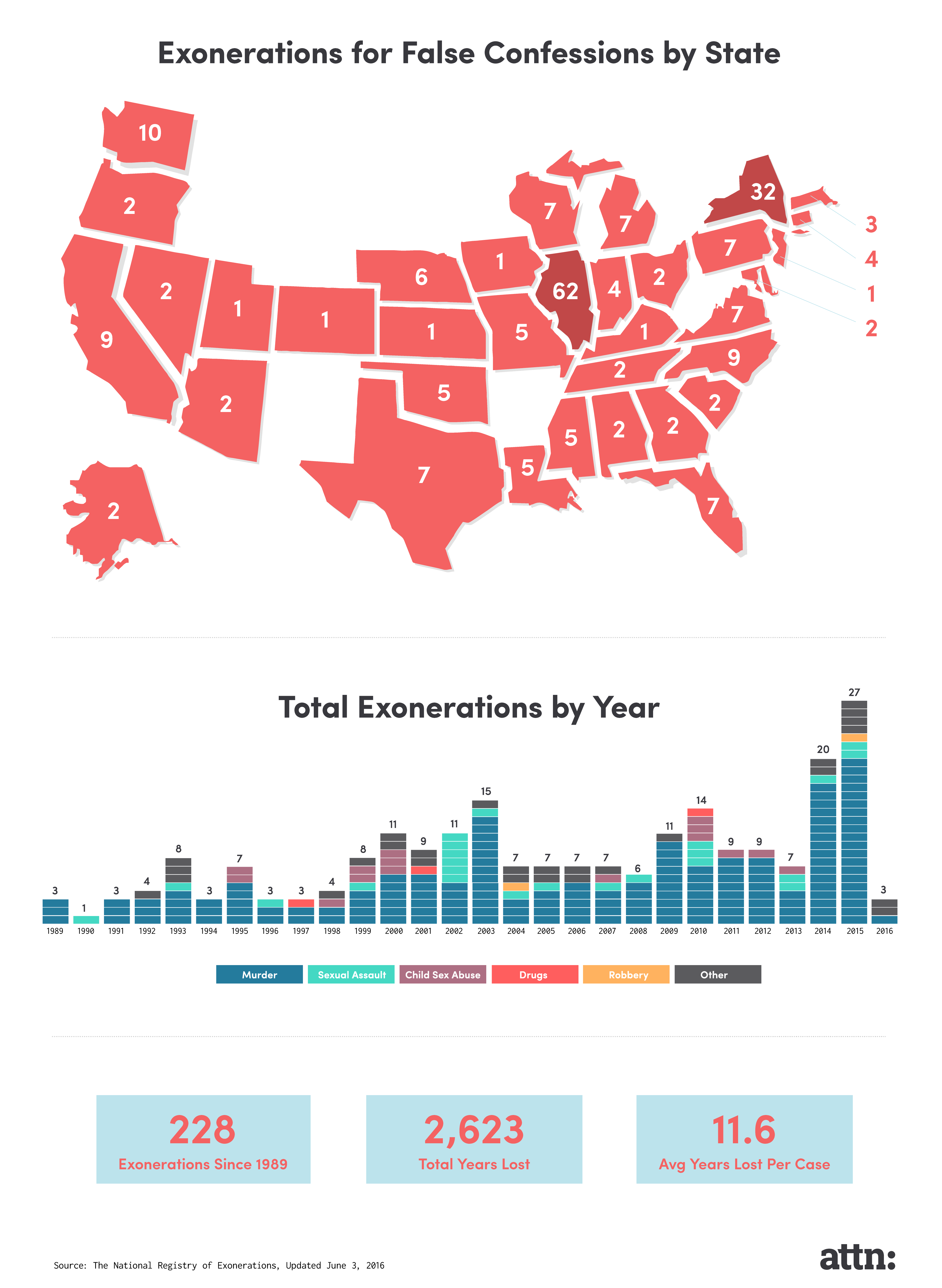Map Shows the Number of People in Your State Who Confessed to a Crime They Didn't Do

By:
It's hard to understand why someone would admit to a crime they didn't commit, but since 1989 innocent people have spent more than a total of 2,600 collective years behind bars for crimes they confessed to doing.
The National Registry of Exonerations at the University of Michigan tracks the reasons people are let out of prison. Since 1989 there were 227 exonerated false confessions through June 3, 2016. There are actually 228 exonerations to date because a Michigan teenager was released from prison for a false confession on June 9, 2016, which ATTN: has confirmed with the registry. The majority of the false confessions are to murders.
This map shows how many people from your state have been exonerated for a crime they confessed to committing.
 ATTN/ Kristen Hodge
ATTN/ Kristen Hodge
Why are the numbers so high for Illinois and New York?
Illinois and New York have the highest numbers of people exonerated for false confessions since 1989, with a whopping 62 and 32 respectively. Editor for the National Exoneration Registry and University of Michigan law professor Samuel Gross told ATTN: via email that it's hard to know the exact reason. These states could have a bad system that encourages false confessions or a good system for exoneration after a conviction.
"We can't know for sure, but in the case of Illinois we think it's both. Most of the exonerations with false confessions in Illinois are from Cook County, Chicago, which has a notorious history of using torture to obtain confessions. If you're not familiar with it, you can google Jon Burge - the commander of the police district where it was most common. That is not especially true for New York, as far as we know. But both states have longstanding and very active innocence organizations, the Innocence Project in New York and the Center on Wrongful Convictions in Chicago, plus highly active criminal defense bars, which probably leads to greater efficiency at finding and exonerating false convictions." - Samuel Gross
Jon Burge is a former Chicago police chief who was convicted of lying about police torture. Prosecutors said that he led the torture of suspects from the 1970s to early 90s, according to The Chicago Tribune.
The map only shows people who have been cleared of their convictions. Conceivably there are still people sitting in jail who confessed to a crime, including murder, they didn't do. In their article "For 50 Years You've Had the Right to Remain Silent," Gross and National Registry of Exonerations researcher Maurice Possley wrote that most suspects who confess are not convicted. Investigators often find other evidence that proves the confession to be false and the charges are dropped. However people who are convicted on a false confession are in a very bad situation.
"Few convictions based on false confessions are cleared by exoneration. That’s true for all wrongful convictions, but especially for those based on confessions. It’s very hard to convince people that a defendant who confessed is innocent." - Samuel Gross and Maurice Possley
So why would someone say they committed a crime when they didn't?
The types of people who falsely confess vary, but there are certain groups who are particularly vulnerable in interrogation rooms, according to Gross and Possley. Young people and people with disabilities are at a higher risk. Davontae Sanford, the Michigan teenager who was let out of prison last week after confessing to a quadruple homicide he didn't commit, was 14 when he was arrested. He is also developmentally disabled and partially blind according to NBC news.
When people get in an interrogation room and are berated by questions from police officers, they panic and say anything to get out, according to experts.
Another teenager in Colorado confessed to a murder he didn't commit and was sentenced to prison when he was 14. He was convicted of murdering a teacher after he went joy riding in her stolen car. Now, Lawrence Lorenzo Montoya is suing the City of Denver for the 13 years he spent behind bars, according to Colorado's CW affiliate KWGN-TV. Montoya's attorney Lisa Polansky said that her client was coerced into making a confession by the detectives.
“Yelling and screaming in his face, making up evidence, banging on the table and cornering him against the wall," Polansky told KWGN-TV. "Telling him he’s going to spend the rest of his life in prison and should say goodbye to his mother.”
The lawsuit says that Montoya told detectives that he didn't commit the murder 65 times before he broke and falsely confessed, according to the local station. Researchers Gross and Possley wrote that stories like Sanford and Montoya's happen fairly regularly:
"Innocent suspects confess because they are terrified and confused and exhausted; because they are deceived or tricked; because they don’t understand what they are doing; because they feel hopeless and helpless and isolated."
ATTN: reached out the the Chicago and New York attorney generals, as well as the Denver Police Department, but we have yet to hear back. We will update when we do.
